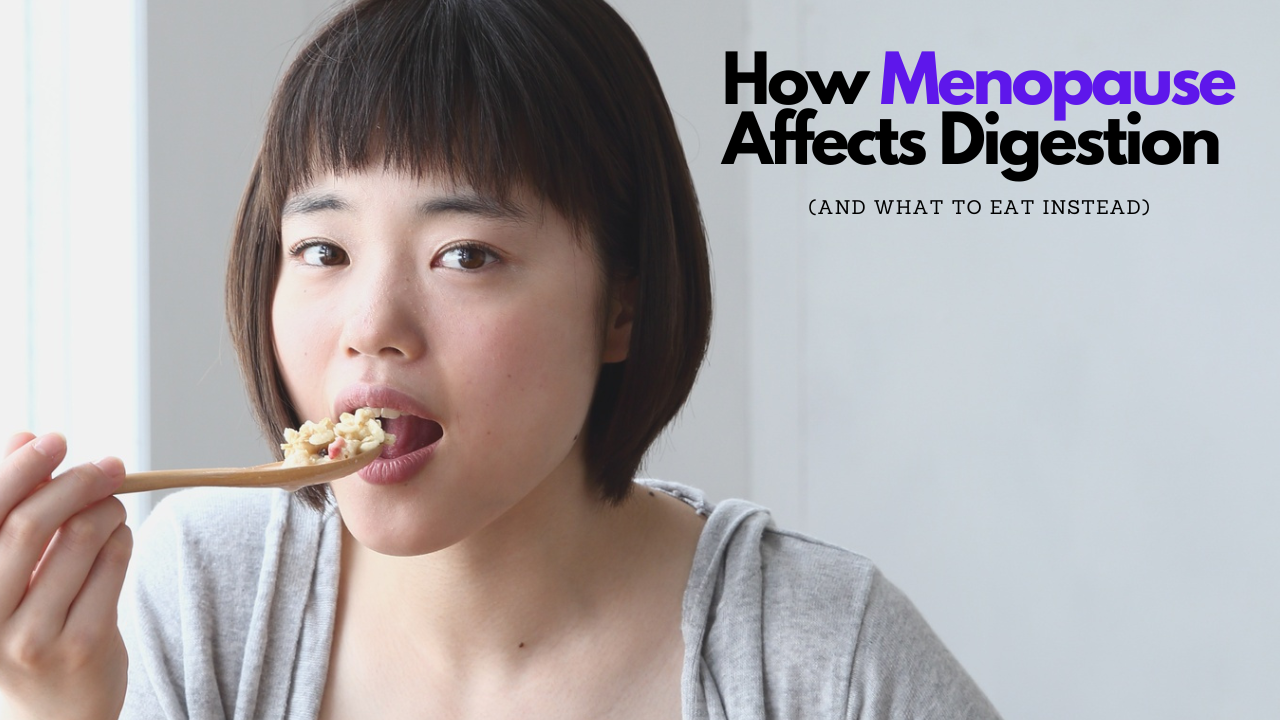How Menopause Affects Digestion (And What to Eat Instead)
Sep 27, 2025
If you’ve noticed more bloating, constipation, or tummy troubles since hitting your 40s, you’re not imagining it. Menopause doesn’t just affect your hormones—it can have a big impact on your digestion too.
The good news? With the right food choices, you can support your gut, ease discomfort, and feel lighter and more energized.
Let’s break down what’s happening in your body and how to eat in a way that helps.
Why Digestion Changes in Menopause
As estrogen and progesterone begin to decline, your digestive system feels the shift:
- Slower motility
Progesterone has a relaxing effect on the gut. When levels fall, food moves more slowly through the digestive tract, often leading to constipation. - Changes in gut bacteria
Estrogen helps maintain a healthy balance of gut microbes. Lower levels can mean more bloating, gas, and even food sensitivities. - Increased cortisol (stress hormone)
Stress levels often climb in midlife, which affects stomach acid production and can trigger indigestion or IBS-like symptoms. - Metabolism slowdown
With less muscle and shifting hormones, digestion and calorie burn naturally become less efficient.
Signs Your Gut Is Feeling the Hormone Shift
- Frequent bloating after meals
- Constipation or slower bowel movements
- Heartburn or indigestion
- Sensitivity to foods you used to tolerate
- Feeling heavy or sluggish after eating
If this sounds familiar, the right foods can make a huge difference.
What to Eat Instead: Gut-Supporting Foods for Menopause
- Fiber-Rich Vegetables & Fruits
Think leafy greens, berries, apples, carrots, and broccoli. These help keep things moving and feed your good gut bacteria. - Lean Protein
Protein helps stabilize blood sugar and supports muscle, which keeps metabolism steady. Choose fish, chicken, eggs, lentils, or Greek yogurt. - Healthy Fats
Omega-3s from salmon, chia seeds, and walnuts reduce inflammation and support hormone balance. - Fermented Foods
Kefir, sauerkraut, kimchi, and kombucha introduce probiotics that can ease bloating and restore balance in the gut. - Hydration Helpers
Water, herbal teas, and high-water foods like cucumber and watermelon support digestion and prevent constipation. - Spices That Soothe
Ginger, turmeric, and fennel can calm the digestive system and reduce bloating.
Foods to Limit (But Not Fear)
- Processed carbs (white bread, pastries, packaged snacks)
- Excess sugar (it feeds the “bad” gut bacteria)
- Carbonated drinks (can increase bloating)
- Heavy fried foods (sluggish digestion)
You don’t have to eliminate them completely—just notice how your body reacts and crowd them out with nourishing options.
Lifestyle Shifts That Help Too
- Move daily: Even a walk helps stimulate digestion.
- Eat slowly: Chewing well reduces bloating and indigestion.
- Manage stress: Try yoga, deep breathing, or journaling.
- Prioritize sleep: Rest repairs the gut and balances hormones.
Bottom Line
Menopause might change how your digestion feels—but it doesn’t mean you have to live with discomfort. By focusing on fiber, protein, healthy fats, and gut-friendly foods, you can support your hormones and your belly.
Your midlife meals can be simple, satisfying, and soothing—helping you feel lighter, more energized, and fully supported through this stage of life.
Menopause doesn’t have to weigh you down. With the right foods, you can thrive from the inside out.
Stay connected with news and updates.
Join our mailing list to receive the latest news and updates from our team.
Don't worry, your information will not be shared.
We hate SPAM. We will never sell your information, for any reason.



